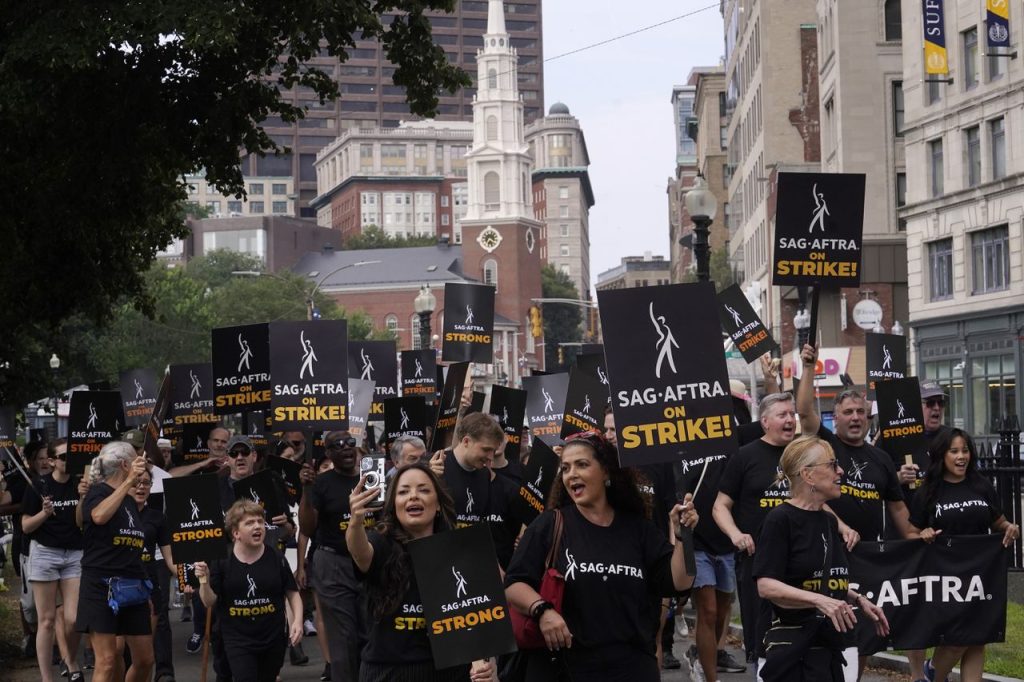Ever since the union representing American actors and television performers went on strike Sept. 14, the union’s activities has not been limited to moviemaking hubs such as Los Angeles.
In the ensuing weeks, the New England chapter of Screen Actors Guild-American Federation of Television and Radio Artists has hosted rallies at Salem, the Boston Common, and in Providence, Rhode Island.
The union is working to secure new negotiations with the Alliance of Motion Picture and Television Producers. The alliance represents Amazon, Apple, Disney, Warner Bros., Discovery, Netflix and more.
The nationwide strike has halted television and movie productions, and could possibly change how members of two entertainment industry unions are compensated.
The rallies organized by the union serve a purpose, according to Andrea Lyman, actor and president of New England Local of SAG-AFTRA.
The union has 4,000 members in New England and about 160,000 nationwide, according to Lyman.
It gives members a chance to network with one another and get connected to resources, such as the interim agreements, Lyman said.
An interim agreement is a contract that allows producers to employ union members to help complete their independent productions, SAG-AFTRA’s website says.
“There’s no limit on the budget only because some of them are modified low-budget productions, which means their budgets (are) no more than $700,000,” said Tom Kemp, actor and vice president of SAG-AFTRA’s New England Local chapter. He also chairs of the union’s TV/Theatrical/Streaming Negotiating Committee.
Productions — such as spin-offs from “The Walking Dead” — signed interim agreements, according to a list posted on SAG-AFTRA’s website. With some productions, union members can audition for roles. On others, they can work on the productions.
This Labor Day, SAG-AFTRA members will join Boston’s union community at the 2023 Greater Boston Labor Council Labor Day Breakfast and March.
And later this month, New England Local is planning a rally in Northampton at Pulaski Park on Sept. 21.
Actor and set medic Ellyana Stanton, who plans to join the picketing in Northampton, said she is optimistic there will be a positive turnout.
“There’s a thriving performing arts community in this area, so I am looking forward to seeing a lot of people show up,” she said.
She currently works as a set medic full-time. One of her recent jobs was working on the production set of the upcoming crime thriller “Barron’s Cove.” A few scenes of the movie were filmed at Court Square in Springfield in June.
Stanton said the film industry took a huge hit during the COVID-19 pandemic, which caused a seven-month shutdown.
“As soon as we were able to get back to work, all of us in this industry were consistently working for about a year-and-a-half with no break in sight because so many projects had been greenlit to come back to Massachusetts,” she said. “There are quite a few I can’t name, per contract. Hopefully, we can make a deal by mid-fall and start production right away.”
The Massachusetts Film Office website reports that of the nine productions filming in the state, all have wrapped, save one: “Blue Hawaii.”
Stanton is a mother of three kids, all of whom have taken on small acting roles. She said this strike also supports the next generation of aspiring actors.
“My kids are acting more so than me, because there’s a higher demand for kids,” she said. “This is also their future I am fighting for.”
Kemp has played roles in movies such as “Sound of Metal,” “Little Women” and “Paterno.” He said streaming services do not tell actors how many views a show or movie receives.
“Our residual rates for streaming are not very good,” Kemp said.
He cited “Suits,” a show that is on Netflix, as an example of poor residuals. He said all of the writers are sharing about $3,000 in residuals.
“That’s how pitiful it is,” he said. “Three years ago, we weren’t dealing with the 11% inflation over the last year and a half. The other thing that’s happened in the last three years has been the rapid moves to streaming platforms, and our contracts are the years in duration. It’s been difficult to keep up with that movement.”
In a statement, Writers Guild of America West Public Policy Director Laura Blum-Smith said the strike should “come as a surprise to no one.”
She said writers are transitioning from a period of rapid investment and competition that brought new content to a place in which entertainment is in the hands of large and powerful corporations.
“For writers, that means fewer buyers for their work, employers who exert more leverage in individual deal negotiations, and depressed pay and working conditions,” Blum-Smith said.
